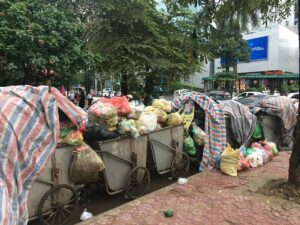Indo-Pacific Plastics Innovation Network
The challenge
Globally, 75 per cent of plastic produced becomes waste. Plastic knows no borders, with plastic waste now considered a planetary crisis.
In March 2022, Australia joined the global fight to end plastic pollution as part of the UN Environment Assembly, agreeing to negotiate a new global treaty on plastic pollution.
Our response

Street market
As part of our Ending Plastic Waste Mission, and together with the support from the Department of Foreign Affairs and Trade and government partners in Indonesia, Thailand, and Vietnam through the Indo-Pacific Plastics Innovation Network (IPPIN), we are leading national plastic waste reduction efforts in the Indo-Pacific region by supporting the next generation of entrepreneurs to change plastic problems into circular, sustainable solutions.
The Indo-Pacific Plastics Innovation Network is using the power of innovation, science, and technology to address this urgent, global problem.
Impact
This collective of researchers, innovators and investors are redefining the life cycle of plastic from production to recycling.
IPPIN is a global network that convenes a Plastics Innovation Hub in Indonesia and the Mekong Plastics Innovation Alliance with Hubs in Thailand, Vietnam and Proto hubs in Cambodia and Laos. The proto-Hubs in Laos and Cambodia are emerging initiatives where IPPIN is working with local stakeholder groups to better understand the current plastics ecosystem.
IPPIN runs series of entrepreneurial programs to upskill emerging innovators to address the following challenges:
- Sustainable alternatives which outperform existing plastics.
- Improving plastics innovation and capturing value beyond first use, to develop lasting circular solutions.
- Empowering decision-making through reliable and accessible information.
IPPIN is committed to refining innovations with strong potential and helping entrepreneurs scale their impact. Recipients engaged in IPPIN’s Accelerator Program who have gone on to receive competitive grants include:
- Geo Trash Management (GTM), an Australian-Indonesian collaboration that has created a new market for previously unrecyclable plastics and rubber by chemically recycling these materials into fuel.
- Citarum River Transformation Project – a multidisciplinary program between Monash University, local Indonesian governments, and communities to develop and implement a waste monitoring program that will benefit both the environment and people of the Citarum River, West Java.

